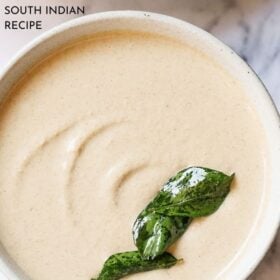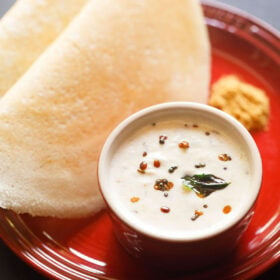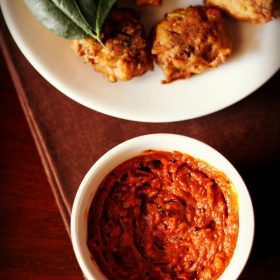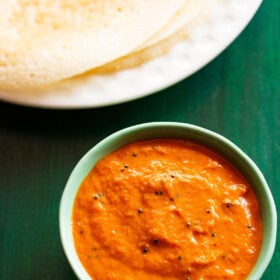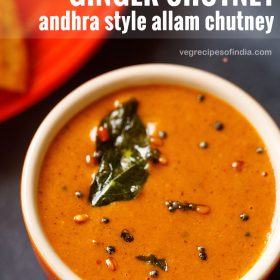Peanut Chutney or Groundnut Chutney is a quick, delicious, and excellent substitute for Coconut Chutney. This packed with flavors, Peanut Chutney is made with peanuts, sesame seeds, chana dal, spices and herbs. Best served or paired with the classic South Indian breakfast of Idli, Dosa, Medu Vada, or Uttapam for a hearty, wholesome, healthy meal. It is naturally vegan too.
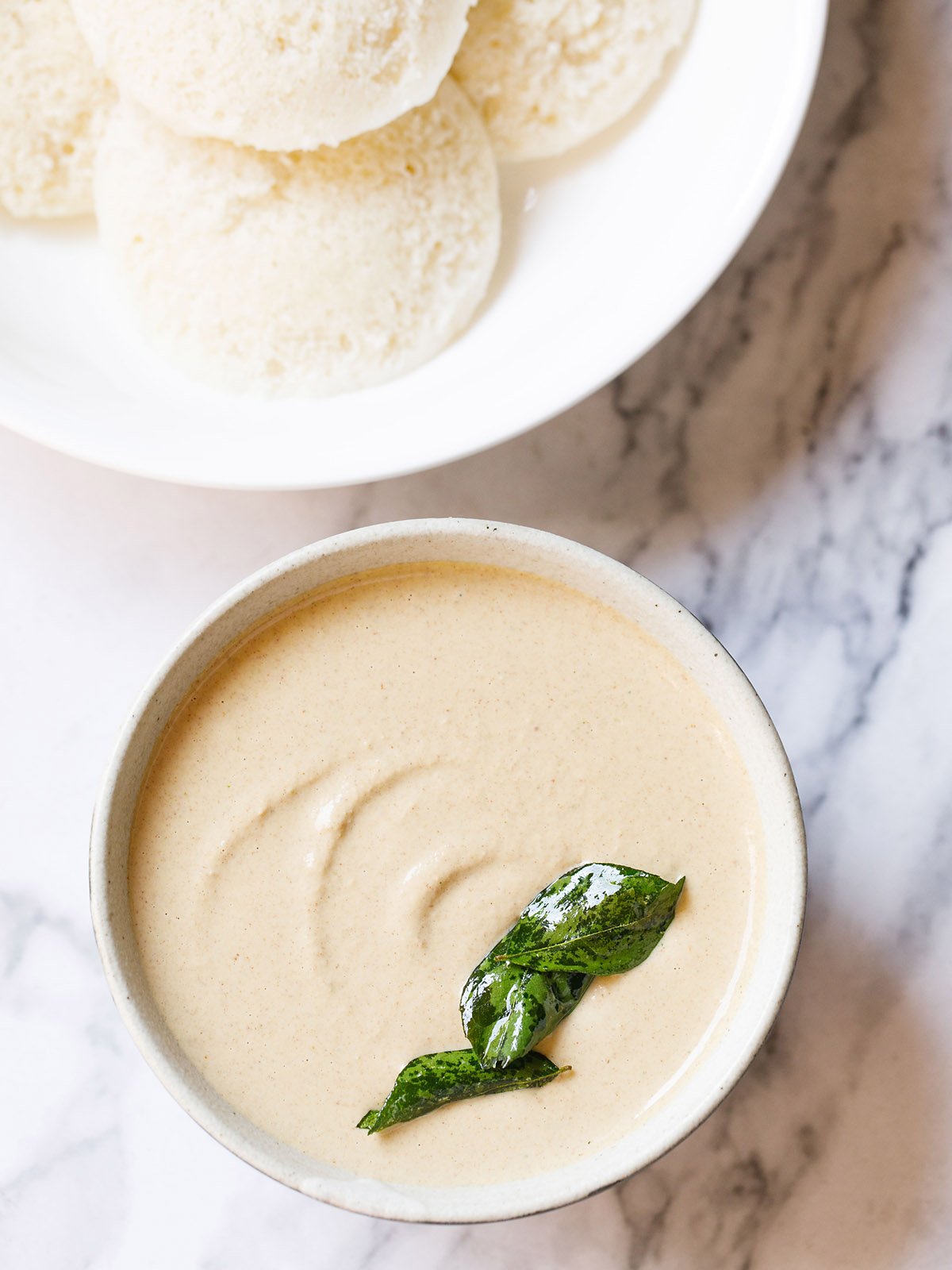
About Peanut Chutney
So like me how many of you like peanuts? It is a wonderful ingredient to work with.
Some Indian curries made with peanuts taste simply delish. They not only add a ton of flavor but also help in thickening these curries.
Peanuts are also known as groundnuts. If you love peanuts, you will go gaga over this South Indian recipe of peanut chutney. It is so good.
This groundnut chutney recipe is also called Palli Chutney in the Andhra and Telangana regions of South India.
The sweet, nutty flavors of peanuts are perfectly balanced with the spice, heat of green chilies, and the umami flavor of chana dal.
Make it and thank me later. You have to try this peanut chutney to know how awesome and fabulous it is.
Making peanut chutney is a breeze and my recipe will fit your needs if you do not have handy coconut – fresh, frozen, or desiccated.
My newly updated recipe is easier, as you can simply make it with raw chana dal without having to use roasted chana dal.
I also include some white sesame seeds. Peanuts, chana dal, and sesame seeds – a healthy trio, isn’t it? So this is a healthy chutney recipe for you.
You know, many times I have both fresh coconut and desiccated coconut in my kitchen. But there are occasions when there is no trace of any coconut in the pantry.
We generally have a typical Indian breakfast in the mornings. Either it is idli or dosa or poha or paratha.
So when I make idli or dosa, I have to make some chutney – right? On such occasions, I make this quick peanut chutney. And what if there are no peanuts or coconut? Then I make Tomato Chutney.
Unlike coconut chutney, this groundnut chutney won’t become spoiled or rancid if you include it in a lunchbox or keep it out for a longer duration at room temperature.
Groundnut chutney is excellent during winters due to the nature of peanuts being heaty.
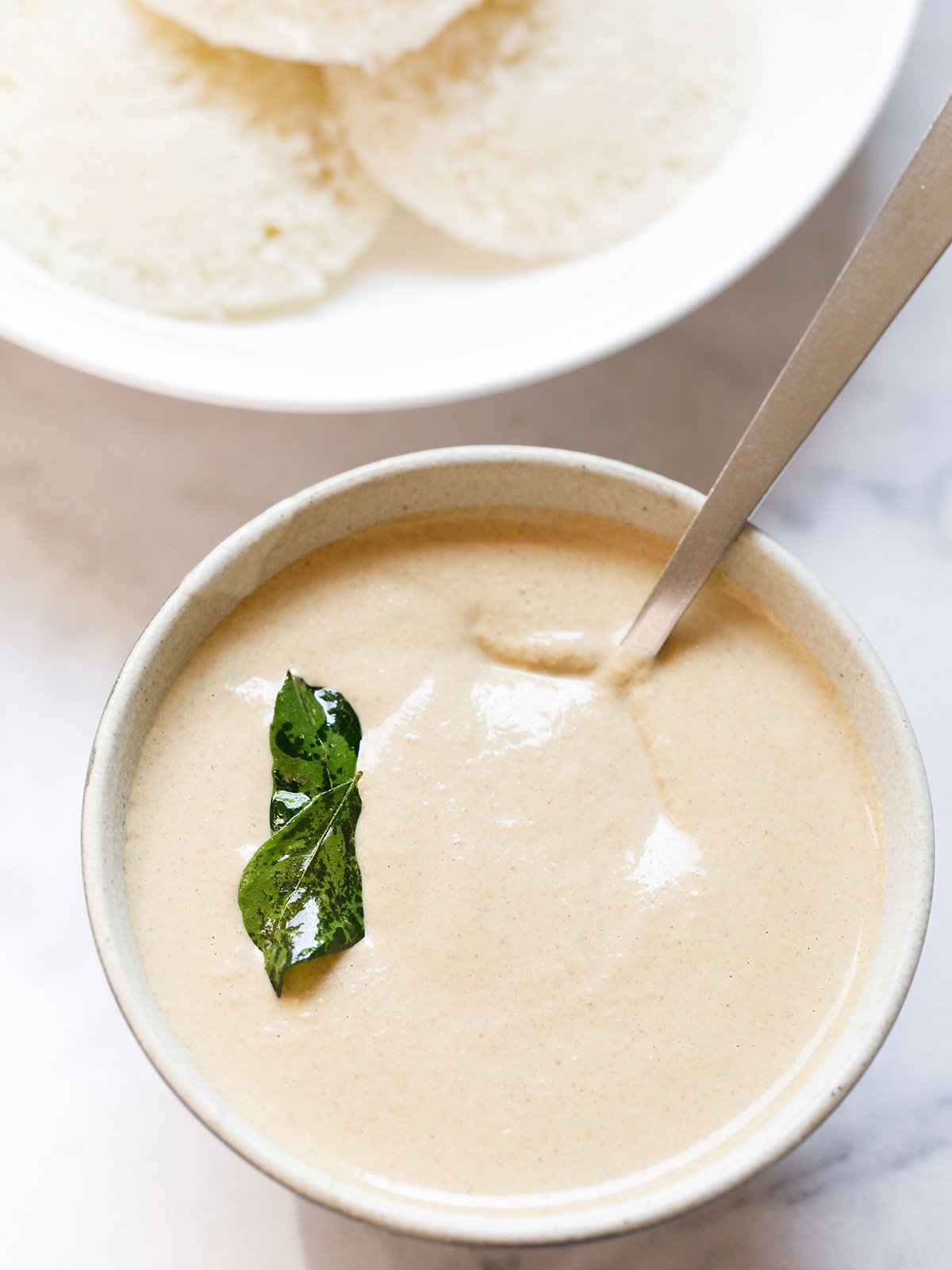
Step-by-Step Guide
How to make Peanut Chutney
Fry Chana Dal
1. Heat 1 tablespoon oil in a pan. Keep the heat to low and add 2 tablespoons chana dal (20 grams). Chana dal is husked and halved baby brown chickpeas. They are also called bengal gram.
For the oil you can use sunflower, peanut, canola, rice bran, safflower, avocado, or grapeseed oil.
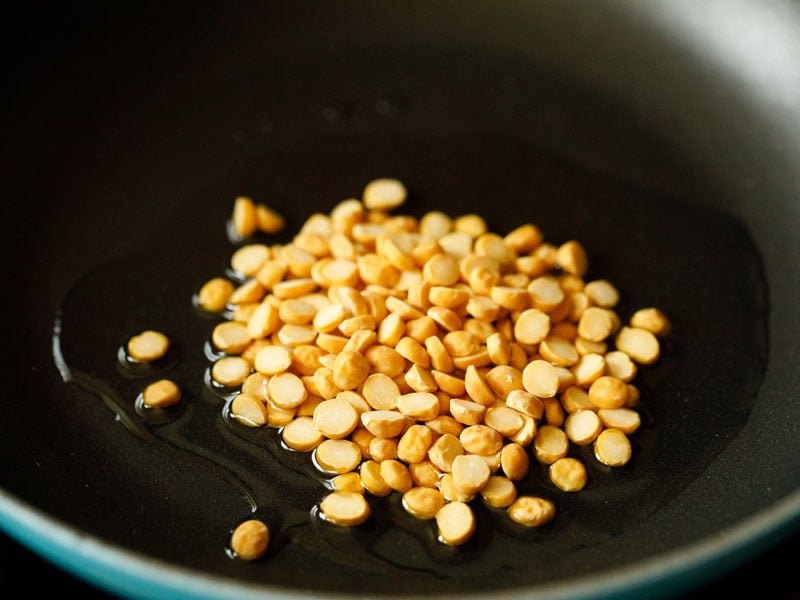
2. Spread them evenly on the pan with each lentil being in direct contact with the pan.
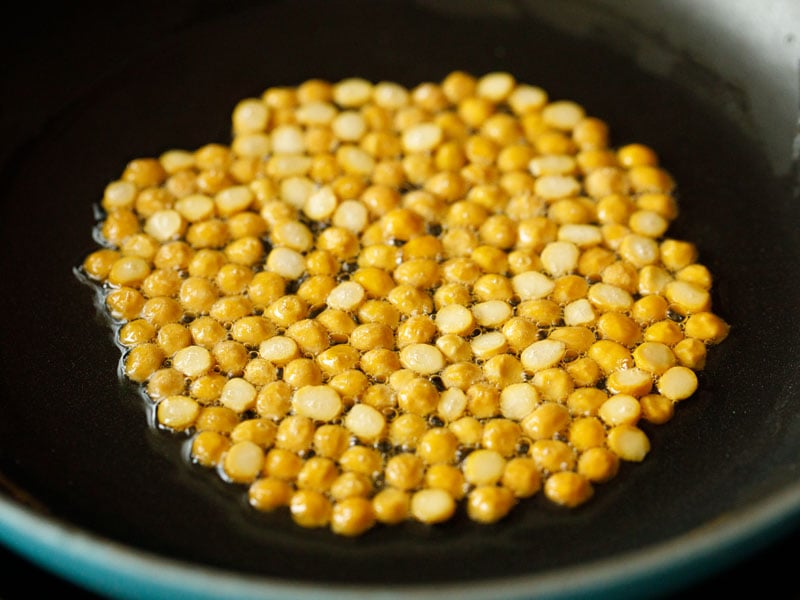
3. Stirring often fry the lentils until they turn golden. Fry them at low heat, so that they do not burn.
Remember to fry them thoroughly as you do not want them to be even a bit raw.
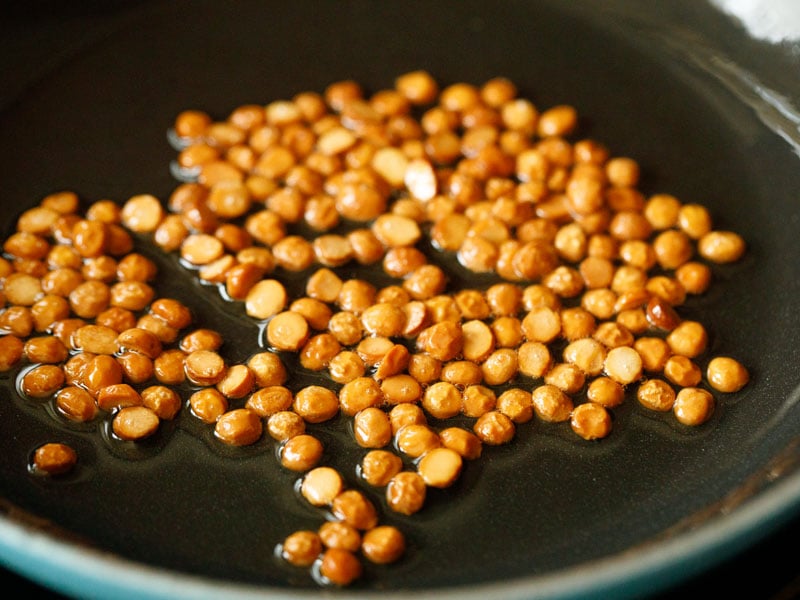
4. Remove with a slotted spoon and set the fried lentils aside.
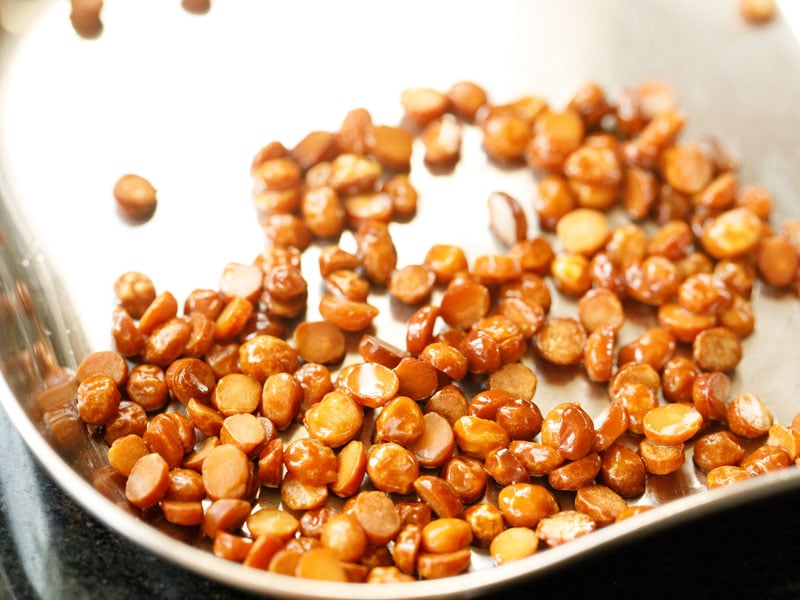
Roast Peanuts
5. To the same oil, add ½ cup peanuts (80 grams).
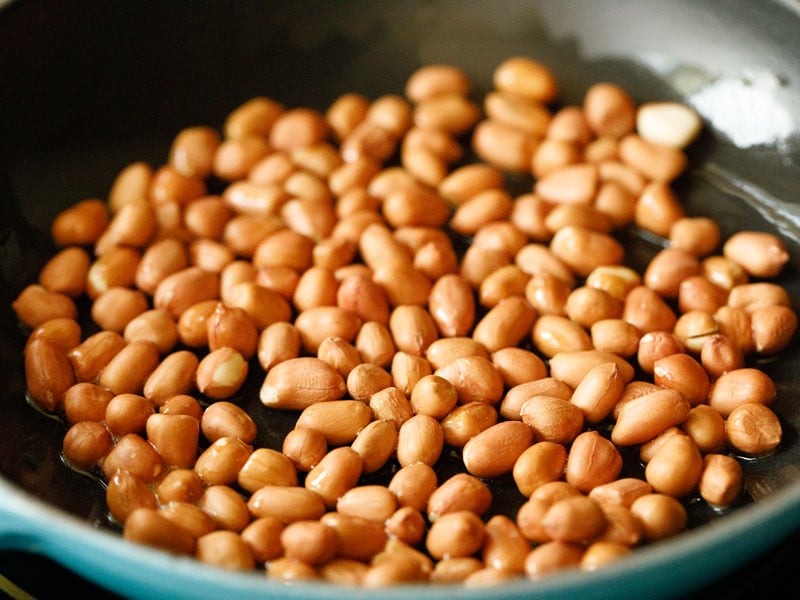
6. Mix them with the oil and start roasting them on low heat.
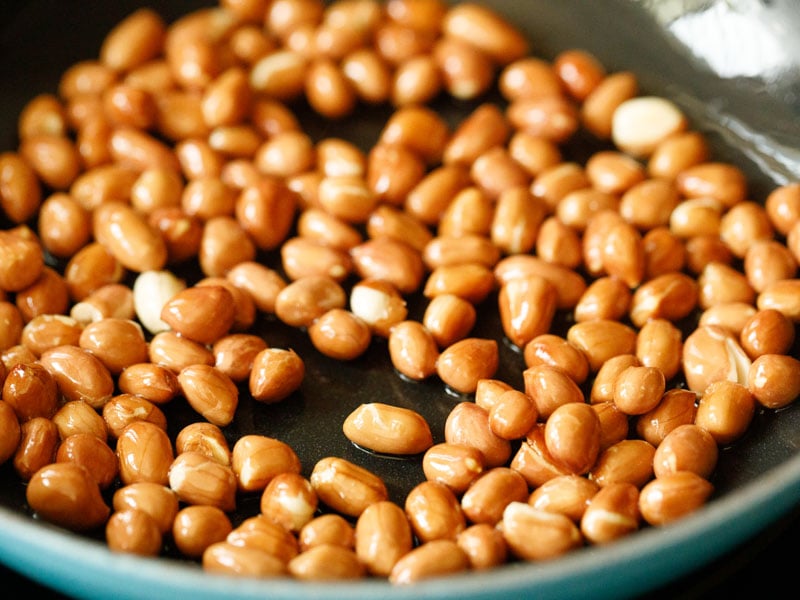
7. Stirring at intervals roast them until they change color and you see their fragile papery skins having fine cracks. You will also hear their sputtering sound.
Roasting them takes 4 to 5 minutes on low to medium-low heat. Taste a few and they should have a crunchy and crisp texture.
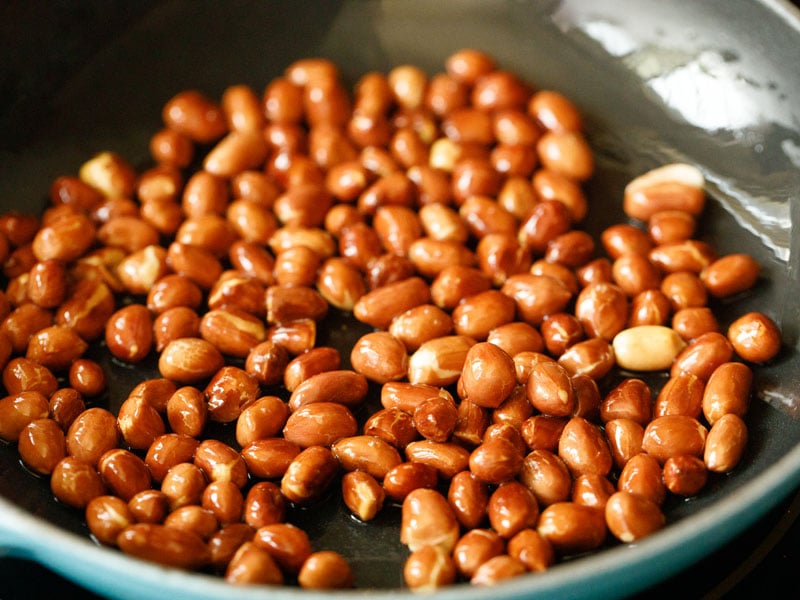
8. Now add 10 to 12 curry leaves (medium to large-sized), 2 green chillies, 2 garlic cloves (small to medium), and 1 pinch asafetida (hing).
Tip: Green chilies bring a great deal of flavor and some heat to the recipe. They help to balance the sweetness from the peanuts.
Depending on the type of green chilies you have, you can add 2 to 3 chilies or even 4 of them. If you have spicy Indian green chilies, then add 1 or 2.
If you have less spicy green chilies, then add 3 or 4. You can also add 2 to 3 dry red chilies in place of the green chilies.
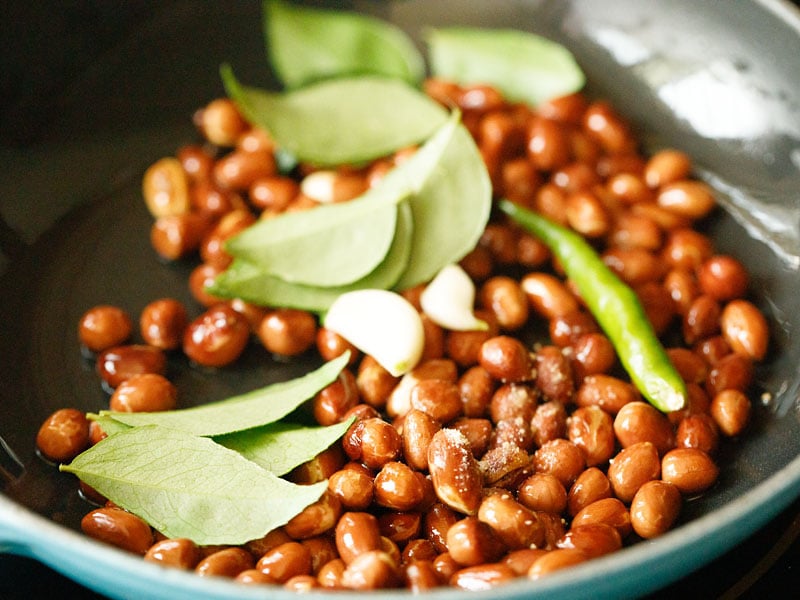
9. Sauté for a minute or until the curry leaves become crisp.
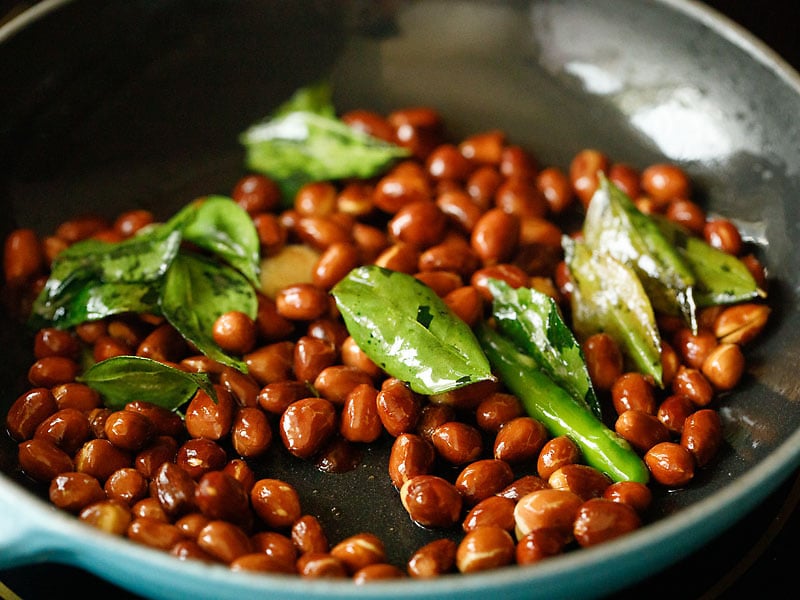
10. Add 1 tablespoon sesame seeds (10 grams).
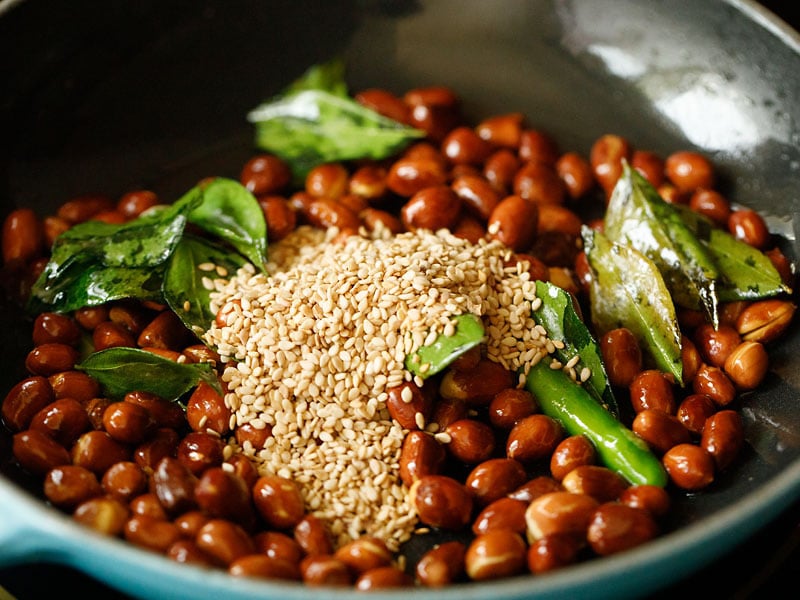
11. Mix and switch off the heat. Set aside the pan so that the groundnut chutney ingredients to cool at room temperature.
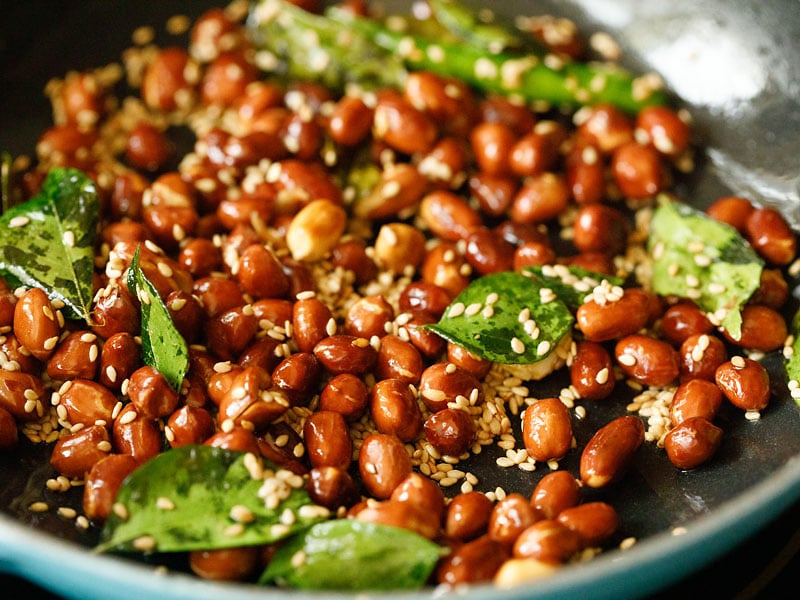
Make Peanut Chutney
12. When the groundnut chutney ingredients have become warm or cooled, place them in a blender or a mixer-grinder. Add the fried chana dal and salt as per taste.
Tip: I would suggest beginning with ½ teaspoon salt when blending. Then add a few pinches as you blend doing the taste test.
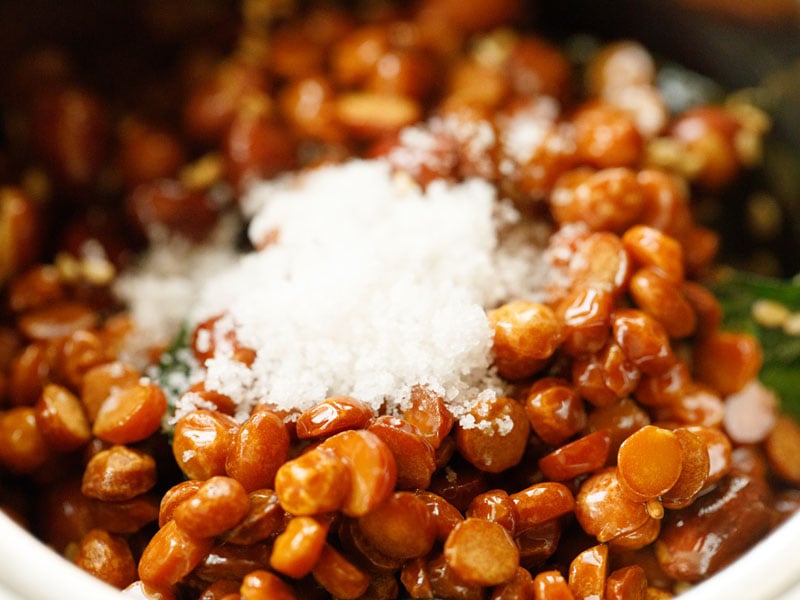
13. Add water in parts and begin to blend.
Tip: I have added ¾ cup water which gives a medium-thick consistency. For a thicker groundnut chutney, add ½ cup water.
You can adjust the consistency by adding less or more water, but do not make the consistency runny or thin.
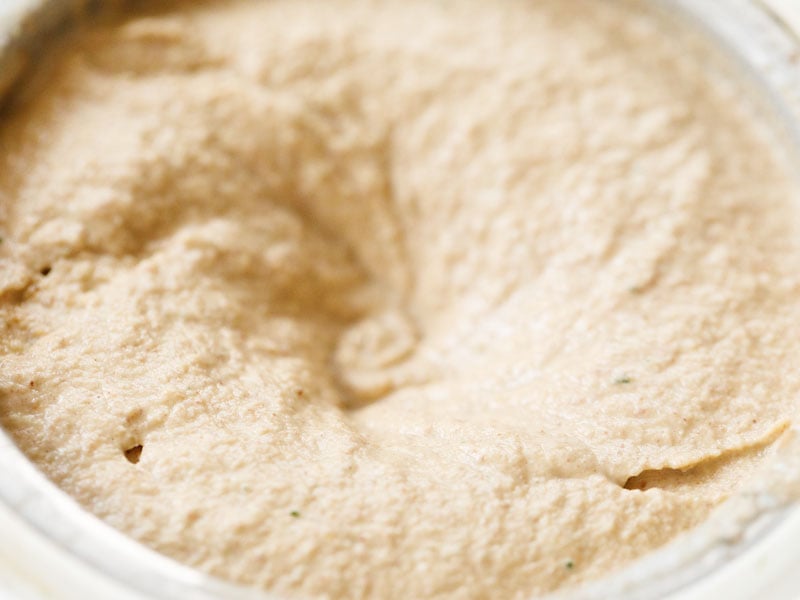
14. Blend to a smooth and fine consistency. Transfer all of the peanut chutney in a bowl. Now if you want you can further temper groundnut chutney.
But you don’t need to as the peanut chutney tastes awesome the way it is.
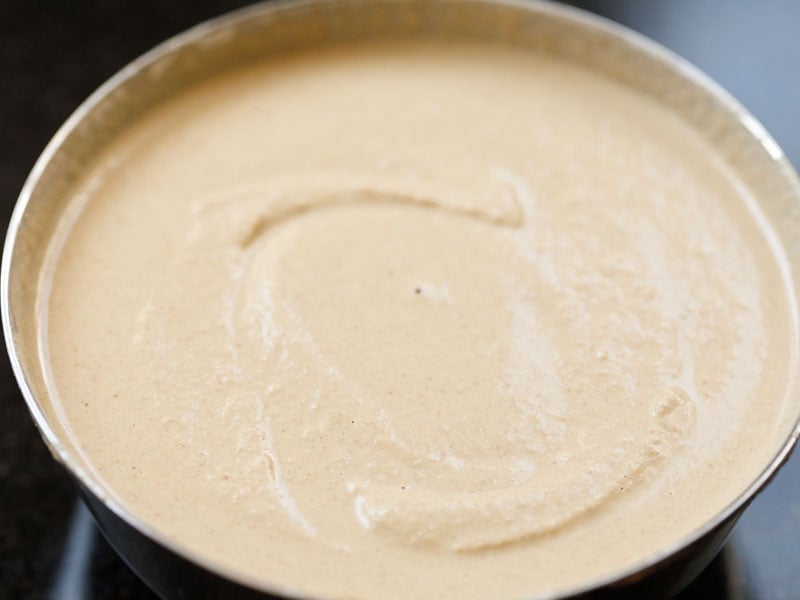
Serving Suggestions
- Idli, Dosa: My peanut chutney recipe tastes too good with the South Indian breakfast of idli, dosa and makes for a super healthy meal. It also pairs well with medu vada, rava idli, rava dosa, and upma.
- Pakora: When I do not have coriander leaves handy to make Coriander Chutney, I prepare this groundnut chutney to serve with the various kinds of pakora – onion pakoda, bread pakoda, or potato pakora.
- Rice: This chutney pairs deliciously as a side condiment with some steamed rice.
- Bread: Slather on a bread (toasted or plain) for a quick snack or breakfast option.
Storage
I make this peanut chutney and refrigerate it. It stays good for 2 to 3 days. Whenever I make light snacks I serve this chutney with them or with the family favorite – idli and dosa.
Store your peanut chutney in an air-tight container. Refrigerate and use whenever required within 2 to 3 days.
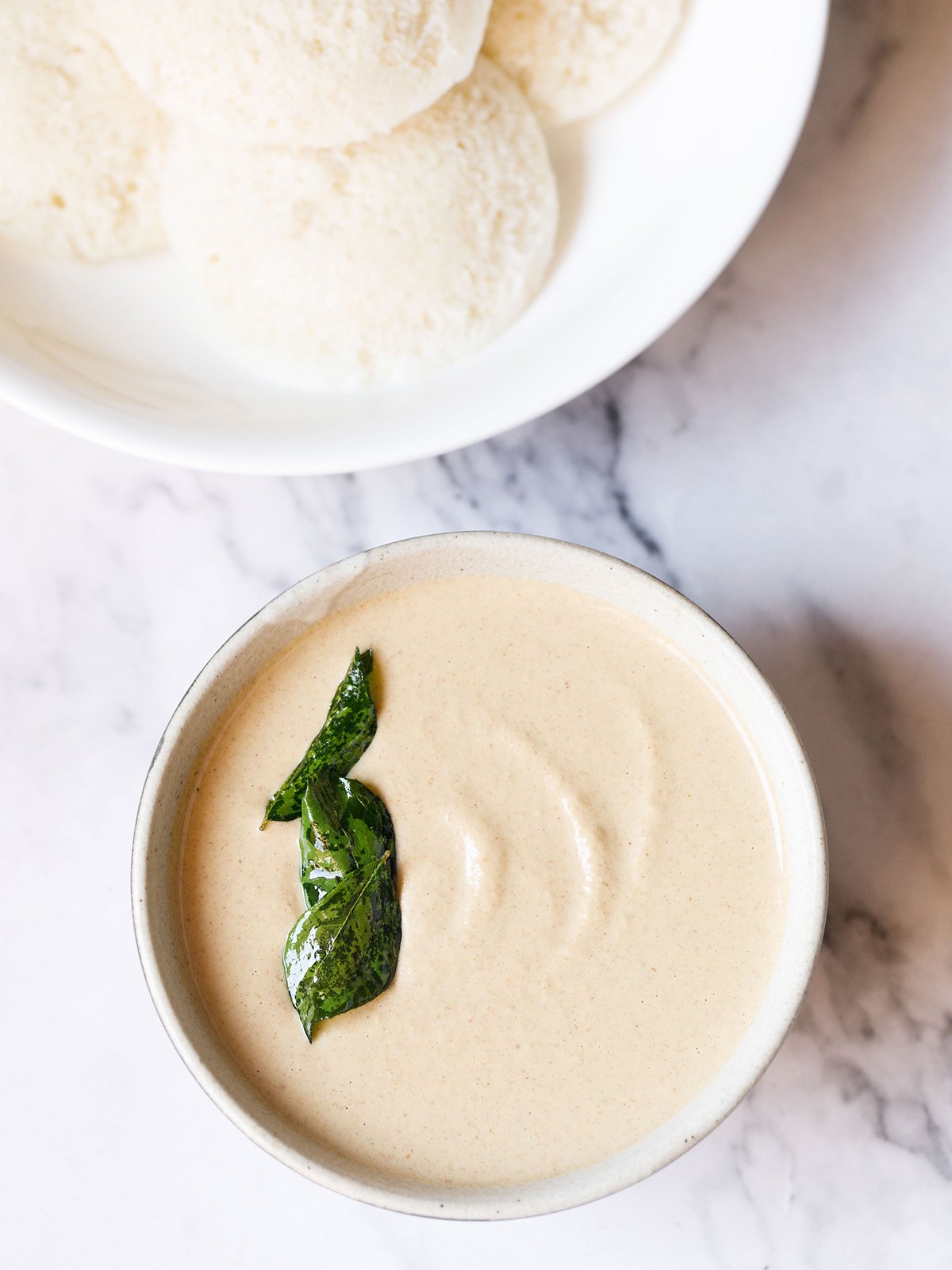
Expert Tips
- Peanuts: To make groundnut chutney, always use fresh dry peanuts. Do not use peanuts that have gone rancid. You can also try to make groundnut chutney with roasted unsalted peanuts. Simply roast them lightly in the oil and then follow the remaining steps in the recipe.
- Chana dal: These yellow lentils are husked and split bengal gram or baby brown chickpeas. If you have roasted chana dal, you can add ¼ cup when you add the sesame seeds.
- Consistency: You can make the groundnut chutney thick or medium, by adding less or more water.
- Variations: If you are looking to make this groundnut chutney more flavorful by adding coconut or curd or doing a tempering, then there is no need. It tastes great on its own. But still, if you prefer to temper peanut chutney, you can do so. But I never felt the need to do this.
FAQs
Yes of course. Peanuts are a rich source of protein and dietary fiber. They also are a good source of minerals and vitamin B and E. Peanuts have a less glycemic index and thus helpful for people with diabetes.
You can omit to add sesame seeds. You can also add black sesame seeds but the color of the groundnut chutney will be different.
Yes sure. Sometimes, I add a tiny piece of tamarind. Rinse or soak the tamarind in some water before you blend it with the remaining ingredients. You can replace tamarind with ½ teaspoon lemon juice or 1 to 2 tablespoons curd (yogurt). Lemon will give a fresh acidic tangy taste, while tamarind will give sour notes.
Yes, ½ teaspoon chopped ginger will work well.
Yes, sure – omit the asafetida if you do not have it – for a gluten-free peanut chutney.
I do not remove the peanut skins. If you prefer having them removed, roast the peanuts. Spread them on a plate and cool at room temperature.
Peel the skins by rubbing the peanuts in your palms. Fry the other ingredients in 1 teaspoon oil. Blend everything together.
Curry leaves are an essential herb in groundnut chutney. Though not a replacement, but adding 2 tablespoons of chopped coriander leaves (cilantro) would give a nice taste.
If you do not have either curry leaves or cilantro, then skip them. Peanut chutney will taste different without the herby flavor of curry leaves.
Skip adding them altogether. The taste of this groundnut chutney won’t be the same without chana dal.
More Idli Chutney Recipes To Try!
Chutney Recipes
Chutney Recipes
Chutney Recipes
Chutney Recipes
Please be sure to rate the recipe in the recipe card or leave a comment below if you have made it. For more veetarian inspirations, Sign Up for my emails or follow me on Instagram, Youtube, Facebook, Pinterest or Twitter.
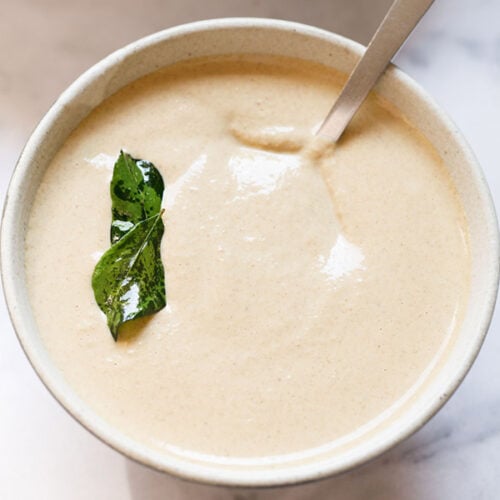
Peanut Chutney Recipe | Groundnut Chutney
Peanut Chutney or Groundnut Chutney is a quick, delicious, vegan chutney condiment made with peanuts, chana dal, sesame seeds, spices and herbs. Serve it with the classic South Indian breakfast of idli, dosa, medu vada or uttapam for a hearty, wholesome, healthy meal.
Prep Time 5 mins
Cook Time 15 mins
Total Time 20 mins
Prevent your screen from going dark while making the recipe
Frying chana dal
Heat 1 tablespoon oil in a pan. Keep the heat to low and add chana dal.
Spread them evenly on the pan. Stirring often fry them until they turn golden taking care they do not burn.
Fry them thoroughly as you do not want any rawness in them. Remove with a slotted spoon and set them aside.
Roasting peanuts
To the same oil, add the peanuts.
Stirring often roast the peanuts on low to medium-low heat for 4 to 5 minutes until they are crispy and crunchy.
Add curry leaves green chillies, garlic cloves and asafoetida. Mix and sauté for a minute or until the curry leaves become crisp.
Add sesame seeds and mix. Switch off heat. Set aside the pan to cool the chutney ingredients at room temperature.
Making peanut chutney
When the chutney ingredients have become warm or at room temperature, place them in a blender or a mixer-grinder. Add the fried chana dal and salt as per taste.
Add water in parts and blend to a smooth consistency.
Remove peanut chutney in a bowl.
Serving suggestions
Idli, dosa, vada: This peanut chutney recipe tastes too good with idli, dosa, vada, upma, rava idli, rava dosa and makes for a super healthy meal.
Pakora: Serve with various kinds of pakora, example onion pakoda, bread pakoda or potato pakora.
Rice: You can also have it as a side condiment with some steamed rice.
Bread: Slather on a bread (toasted or plain) for a quick snack or breakfast option.
Ingredient Notes
- Chana dal: These yellow lentils are husked and split bengal gram or brown baby chickpeas. If using roasted chana dal, add ¼ cup when you add the sesame seeds.
- Peanuts: Always use fresh dry peanuts. Do not use peanuts that have gone rancid. If using roasted unsalted peanuts, simply roast them lightly in oil and then follow the remaining steps in the recipe.
- Consistency: By changing the quantity of water, you can have a thick or medium consistency.
- Variations: If you are looking to make this chutney more flavorful by adding coconut or curd or doing a tempering, then there is no need. It tastes great on its own. But still, if you prefer to temper, you can do so.
Ingredient Swaps
- White sesame seeds: Simply omit or replace them with black sesame seeds. The color of groundnut chutney will be different with black sesame seeds.
- Garlic: Use about ½ inch ginger.
- Asafetida: Skip adding it to the peanut chutney.
- Curry leaves: Not a replacement, but adding 2 tablespoons of chopped coriander leaves (cilantro) gives a nice taste. Skip them if you do not have these. Note that without the herby flavor of curry leaves, groundnut chutney will have a different taste.
- Chana dal: Skip adding them entirely.
Nutrition Facts
Peanut Chutney Recipe | Groundnut Chutney
Amount Per Serving
Calories 186 Calories from Fat 126
% Daily Value*
Fat 14g22%
Saturated Fat 2g13%
Sodium 369mg16%
Potassium 129mg4%
Carbohydrates 12g4%
Fiber 4g17%
Sugar 2g2%
Protein 6g12%
Vitamin A 113IU2%
Vitamin B1 (Thiamine) 1mg67%
Vitamin B2 (Riboflavin) 1mg59%
Vitamin B3 (Niacin) 37mg185%
Vitamin B6 1mg50%
Vitamin C 63mg76%
Vitamin E 3mg20%
Calcium 56mg6%
Vitamin B9 (Folate) 381µg95%
Iron 1mg6%
Magnesium 39mg10%
Phosphorus 78mg8%
Zinc 1mg7%
* Percent Daily Values are based on a 2000 calorie diet.
This Peanut Chutney recipe from the archives first published on Feb 2013 has been republished and updated on January 2022.
Source link


